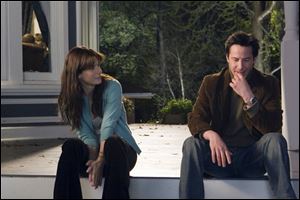
Movie review: The Lake House **
6/16/2006
Sandra Bullock and Keanu Reeves.
This is disaster week, apparently. At the multiplex, you have your choice of catastrophic scenarios: Al Gore lecturing on the ominous ramifications of global climate change in An Inconvenient Truth; the (cough) much-anticipated sequel to Garfield; Jack Black wearing Spandex in Nacho Libre; and here, The Lake House, in which Sandra Bullock and Keanu Reeves, if I'm getting this correctly (and I may be wrong), tear the fabric of time and space, altering history itself.
Again, I may be wrong.
But all this shredding of laws of the universe by the cast of Speed seems awfully selfish. The world will now end in the name of keeping the lease on a cool time-share just outside Chicago.
Granted, it's sweet real estate, a series of glass boxes resting above a lake on stilts. Sandy lives there in 2006, Keanu in 2004. Moving out, she leaves a forwarding address. Moving in two years earlier, he gets her note. They flirt and finally fall in love - in remarkably matter-of-fact fashion considering the whole long-distance time warp. They communicate via a rusty old mailbox sitting on a wormhole.
Think sci-fi romance.
Minus the science, and most of the romance, too - practical romance, anyway (it is one of those boy-keeps-missing-girl pictures, after all). I easily spent a third of the movie keeping it straight: Why can't they arrange to meet in her (or his) time? When they do and he doesn't show up, should she really be angry she was stood-up by a guy from another dimension? Sometimes the film's winsome mood works; with all the pining and yearning, I arranged a flow chart in my notebook and had the story sorted out in no time.
Sometimes director Alejandro Agresti (Valentin), though, is overly sure of the lyricism in the conceit and slips too comfortably out of reality. For example, Sandy and Keanu communicate through letter, which works until the prospect of two people standing at a mailbox gets old. At which point they begin just talking to each other, not in narration, but out loud, in public places. Nobody notices - or crosses the street as Keanu, as stoic as usual (a little too intense to look completely relaxed), sits on a park bench and talks in that booming baritone to himself.
I wish I were being glib.
Written by Pulitzer Prize-winning playwright David Auburn (Proof), clearly inspired by the time-space tinkery screenplays of Charlie Kaufman (Eternal Sunshine of the Spotless Mind), The Lake House is admirably more ambitious than bad, more poetic than practical. (We never do learn how all this is happening, smartly.) It wants to find common ground between sentiment and head-trips.
If that sounds like a challenge Eternal Sunshine met with spectacular results, Lake House wants to make a strange idea work more broadly, unfortunately with less humor and way more solemnity. It's a drag.
What it needs is a nimble hand. Instead there are obvious songs (Carole King singing "It's Too Late"); an ending telescoped way too early; an extended shout-out to Jane Austen's Persuasion, which was also about longing; and finally the lake house itself, a tortured metaphor for the inability of two people who talk to each other clearly, who can see everything around them, but are stopped from touching by walls of glass.
Yeah, I don't get it, either.
There are nuggets of lovely ideas, though: for instance, two people, very much in love, are moved by the same copy of Persuasion but never meet.
Primarily, however, The Lake House is inadvertent time travel: it shoots us back to '95, when Bullock starred in many romances like this about the lovelorn. Heroes back then drove pickups no matter how rich they were. Sandy was still adorable and in her 30s. Movies were still mash-ups of established hits ("It's Ghost meets The Notebook"). And Keanu Reeves, who knows from alternate universes, having stumbled on another one in Chicago in The Matrix, transcended time and space and his acting. Whoa.